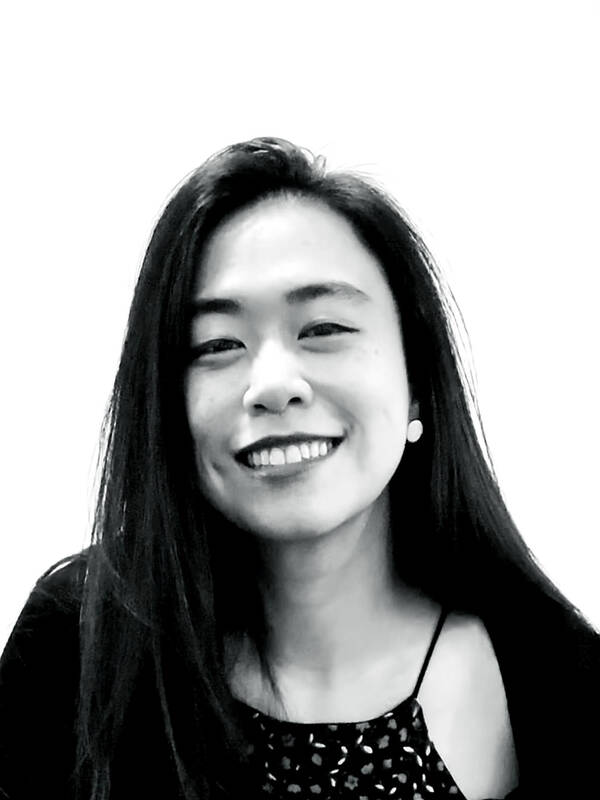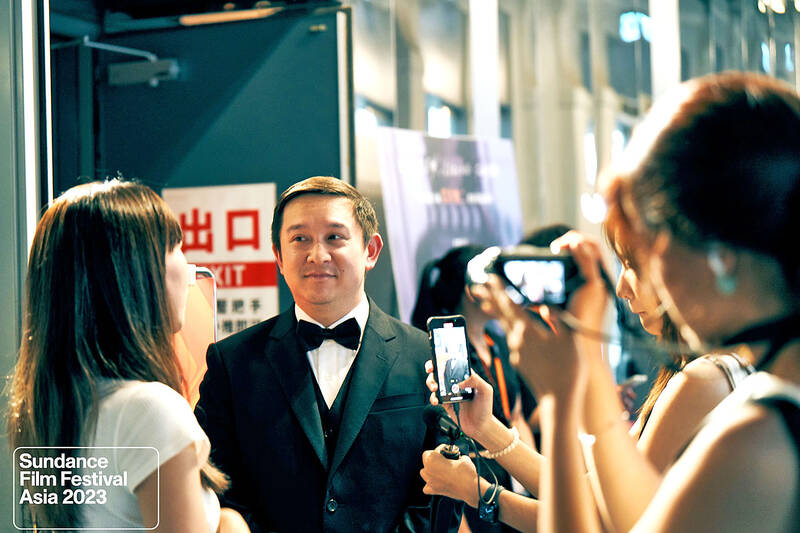When the Sundance Film Festival: Asia came to Taipei for the first time last year, bringing with it an unprecedented crowd of Hollywood A-listers, “We had more parties than screenings,” said Iris Wu (吳采頤), a Taiwanese tech entrepreneur based in Los Angeles, who is one of the event’s three key organizers.
The August event was organized in just three months and had only five films, but this year’s program will more than double in scale and bring an array of Hollywood talent when Sundance Asia returns to Taipei next week, with events from Aug. 21 to Aug. 25 using the Huashan 1912 Culture Park and Syntrend Creative Park as major venues.
The event’s biggest draw will again be California film industry star power, including Game of Thrones director Alan Taylor, Westworld showrunner Lisa Joy, Joker cinematographer Lawrence Sher, Gravity sound mixer Skip Lievsay, Japanese star animator Macoto Tezka, Guardians of the Galaxy screenwriter Nicole Perlman, and Taiwanese-American co-founder of the film ratings website Rottentomatoes.com Patrick Lee.

Photo: david Frazier
AND THEN WE PARTY
For the festival’s opening, these VIP guests will appear first at a red carpet media spectacle outside Taipei’s SPOT Cinema. Then during the screening of the opening film –– Didi (弟弟) by Taiwanese-American director Sean Wang (王湘聖), which won both jury and audience awards for best fiction film at Sundance earlier this year –– most of these celebs will walk straight into a next-door warehouse-sized music venue, Legacy, “And then we just start partying,” said Wu.
This kind of glitzy kickoff will present a huge departure from the standard fare of the Taiwanese film scene, where major events like the Golden Horse, Taipei Film Festival and Kaohsiung Film Festival largely treat parties as afterthoughts and place little importance on networking events, industry mingling, or international VIPs.

Photo courtesy of Sundance Film Festival: Asia
“In this industry, talking to people is actually what these kinds of events are all about,” Wu said. “If you have been to other film festivals like Cannes or Sundance, the parties are just these gatherings of awesome people from all around the world.”
As rotating watering holes for top film talent, festivals with industry events have become especially important since COVID, which spurred the rise of streaming platforms as well as global co-productions
“Everyone’s thinking not just about their immediate circle, but, ‘How do I align with resources from other countries?’” Wu said.

Photo courtesy of Sundance Film Festival: Asia
She added that Taiwan is “missing this kind of vibe.”
SATELLITE EVENT
Sundance Asia was created in 2016 as a satellite event of Sundance, America’s most important indie film festival, which was founded by Robert Redford in 1978 and is held each January in Park City, Utah. Sundance currently only holds one other satellite event in London.

Photo courtesy of Sundance Film Festival: Asia
Initiated as Sundance Hong Kong in 2014, the event changed its name to Sundance Asia in 2016 and was held in the citystate until 2019. But the Hong Kong event was put on pause due to COVID-19 and China’s crackdowns on democratic freedoms. In 2022 the festival moved on to Jakarta.
Taipei’s chance to host Sundance Asia came up suddenly early last year, when the event license unexpectedly came up for grabs. Taiwanese-American Kevin Lin (林士斌), founder of the popular Twitch livestreaming app, snapped it up and enlisted Wu and Jonathan Liao (廖炳坤), co-founder of the Futureward coworking space in Taipei, as event partners.
With Lin’s connections in Silicon Valley and Wu in Los Angeles, this team further harnessed a clique of Taiwanese and Taiwanese-American stars wishing, as Lin put it last year in an interview with Focus Taiwan, to “build a bridge” back to Taiwan. At the festival last year, these stars included Fast and Furious director Justin Lin (林詣彬), The Lego Movie producer Dan Lin (林暐), Hollywood director George Huang, and Taiwanese-American actress Janet Hsieh (謝怡芬).

Photo courtesy of Sundance Film Festival: Asia
Wu invited most of these big names.
“I just told them we can go eat beef noodle soup together and they said, ‘Yeah, I’ll be there,’” she said.
‘TRICK YOUR BRAIN’
Born and raised in Taipei, Wu has bootstrapped herself to Hollywood success in only a decade. After studying biotechnology at Taipei Medical University, she altered course to focus on music technology at New York University. Shortly after her US graduation, she began developing a technology that uses how the brain measures sound at different distances to, as Wu explained, “trick your brain” to recreate immersive full cinema sound with only two speakers. This software-driven tech became the core product of a company she founded in 2014, Ambidio
With applications for everything from home cinemas to smartphones, Wu’s tech found an early believer in the George Lucas-owned company Skywalker Sound, who referred her to Disney, which signed on as an early investor. Ambidio now works with multiple Hollywood studios, including top names like Netflix and HBO.
Wu and Lin first connected a few years ago in Taipei, where they’d been invited to speak on the same panel at Computex, Taiwan’s top electronics expo. Following that first meeting, Wu said, they became “drinking buddies. And then one night last year at like 2 o’clock in the morning, he called me.”
Lin pretty much never called at such a late hour, and Wu had just come home from a party, “So I was really, really wasted.”
When Wu picked up, the question Lin asked her was, “Have you ever heard of Sundance? Are they big?”
“And I was like, ‘Yeah, Sundance is pretty big,’” Wu said.
“Then Kevin asked me, ‘How about Sundance in Taiwan?’”
“‘I was like, ‘Sure, let’s do Sundance in Taiwan.’ And he was like, ‘Cool, I’ll call you back tomorrow.’”
With Sundance Asia, Wu has used her personal rolodex to step into the role of programming panels and other events, while films are selected by Sundance in-house programmers with reference to a wish-list she gives them. Lin, whom she describes as “the spirit of the whole thing,” acts as a sort of CEO, handling partnerships, fundraising, and sponsors, she said. And Taipei-based Jonathan Lin — “the only rational person on the team”— deals with on-the-ground event production.
This year’s film lineup includes 10 feature films from Sundance’s core US festival, as well as two short film programs and local short film awards. Beyond the opening film Didi, a critically celebrated coming-of-age story of a 13-year-old Taiwanese-American in California, films cover stories and themes from around the world. Kneecap, the UK-produced story of a Belfast rap duo who push a revival of the Irish language, has been wildly popular on the festival circuit all this year. Documentaries include Porcelain War, about artists who become soldiers in Ukraine, and Another Kind of Wilderness, which looks at a Norwegian family living off the grid that’s thrust back into the modern world.
Visiting Hollywood stars will interact with audiences and local industry through eight master panels, five workshops, a Sundance Institute Screenwriters Intensive and more events to be announced.
Visiting masters span the filmmaking process from “pre-production to post-production,” said Wu, who then reeled off a list that included directors, producers, a Marvel character designer, sound engineers, cinematographers, and screenwriters — all with blockbuster credits.
“Everyone in the pipeline gets highlighted,” she said.
But the real secret sauce of Sundance Asia in Taipei is the in-person interaction between local and overseas creative communities.
“You know, just partying and singing karaoke with everyone. That’s a very rare chance,” said Wu. “Taiwanese film industry people don’t usually get to talk with these Hollywood A-listers. We’re trying to change that.”

That US assistance was a model for Taiwan’s spectacular development success was early recognized by policymakers and analysts. In a report to the US Congress for the fiscal year 1962, former President John F. Kennedy noted Taiwan’s “rapid economic growth,” was “producing a substantial net gain in living.” Kennedy had a stake in Taiwan’s achievements and the US’ official development assistance (ODA) in general: In September 1961, his entreaty to make the 1960s a “decade of development,” and an accompanying proposal for dedicated legislation to this end, had been formalized by congressional passage of the Foreign Assistance Act. Two

Despite the intense sunshine, we were hardly breaking a sweat as we cruised along the flat, dedicated bike lane, well protected from the heat by a canopy of trees. The electric assist on the bikes likely made a difference, too. Far removed from the bustle and noise of the Taichung traffic, we admired the serene rural scenery, making our way over rivers, alongside rice paddies and through pear orchards. Our route for the day covered two bike paths that connect in Fengyuan District (豐原) and are best done together. The Hou-Feng Bike Path (后豐鐵馬道) runs southward from Houli District (后里) while the

March 31 to April 6 On May 13, 1950, National Taiwan University Hospital otolaryngologist Su You-peng (蘇友鵬) was summoned to the director’s office. He thought someone had complained about him practicing the violin at night, but when he entered the room, he knew something was terribly wrong. He saw several burly men who appeared to be government secret agents, and three other resident doctors: internist Hsu Chiang (許強), dermatologist Hu Pao-chen (胡寶珍) and ophthalmologist Hu Hsin-lin (胡鑫麟). They were handcuffed, herded onto two jeeps and taken to the Secrecy Bureau (保密局) for questioning. Su was still in his doctor’s robes at

Mirror mirror on the wall, what’s the fairest Disney live-action remake of them all? Wait, mirror. Hold on a second. Maybe choosing from the likes of Alice in Wonderland (2010), Mulan (2020) and The Lion King (2019) isn’t such a good idea. Mirror, on second thought, what’s on Netflix? Even the most devoted fans would have to acknowledge that these have not been the most illustrious illustrations of Disney magic. At their best (Pete’s Dragon? Cinderella?) they breathe life into old classics that could use a little updating. At their worst, well, blue Will Smith. Given the rapacious rate of remakes in modern